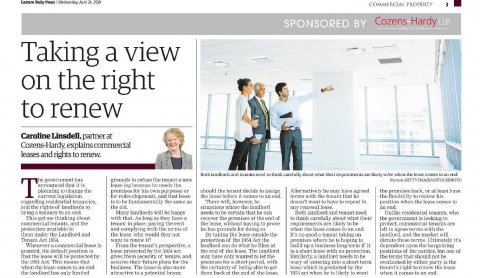Commercial leases and rights to renew
The government has announced that it is planning to change the current legislation regarding residential tenancies, and the rights of landlords to bring a tenancy to an end.
This got me thinking about commercial tenants, and the protection available to them under the Landlord and Tenant Act 1954.
Whenever a commercial lease is granted, the default position is that the lease will be protected by the 1954 Act. This means that when the lease comes to an end the landlord has only limited grounds to refuse the tenant a new lease, (eg because he needs the premises for his own purposes or for redevelopment), and that lease is to be fundamentally the same as the old.
Many landlords will be happy with that. As long as they have a tenant in place, paying the rent and complying with the terms of the lease, why would they not want to renew it?
From the tenant’s perspective, a lease protected by the 1954 act gives them security of tenure, and secures their future plans for the business. The lease is also more attractive to a potential buyer, should the tenant decide to assign the lease before it comes to an end.
There will, however, be situations where the landlord needs to be certain that he can recover the premises at the end of the lease, without having to prove he has grounds for doing so.
By taking the lease outside the protection of the 1954 Act the landlord can do what he likes at the end of the lease. The landlord may have only wanted to let the premises for a short period, with the certainty of being able to get them back at the end of the lease. Alternatively he may have agreed terms with the tenant that he doesn’t want to have to repeat in any renewal lease.
Both landlord and tenant need to think carefully about what their requirements are likely to be when the lease comes to an end. It’s no good a tenant taking on premises where he is hoping to build up a business long-term if it is a short lease with no protection. Similarly, a landlord needs to be wary of entering into a short term lease which is protected by the 1954 act when he is likely to want the premises back, or at least have the flexibility to review his position when the lease comes to an end.
Unlike residential tenants, who the government is looking to protect, commercial tenants are left to agree terms with the landlord, and the market will dictate these terms. Ultimately it’s dependent upon the bargaining positions of the parties, but one of the terms that should not be overlooked by either party is the tenant’s right to renew the lease when it comes to an end.

